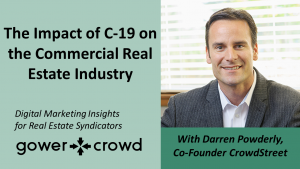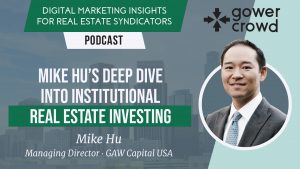WHITE BOARD WORKSHOP
Need More Money to Finance Your Real Estate Projects?
Learn how to find more investors, raise more money, and finance your real estate projects online.
230 Jason Schwetz, Triple Net Zero Debt

Jason Schwetz, President and Founder of Triple Net Zero Debt.
I am originally from Virginia Beach, Virginia. I went to college in the mountains of Virginia and headed west, as they say, right out of college and got a job working for a shopping center syndication company out of Los Angeles literally starting at the bottom, collecting delinquent rents. That was interesting in and of itself, and I moved from collecting delinquent rents to property management, from property management on to leasing, from leasing to financing of shopping centers and from that went to acquisitions and dispositions.
What I have enjoyed the most through the whole cycle has been working with companies and leasing space and understanding their businesses and how they're going to fit into the property, whether it's a shopping center or single tenant property, either way. I have done anything and everything there is to do with shopping centerswith the sole exception that I have never purchased dirt and built from the ground up. I have added on to shopping centers, torn down centers, and renovated anything and everything, but I have not done ground up development.
Impact of the Internet

For years and years and years they just would not address the challenge of the internet. There were no conferences on it. And as a shopping center owner I'm sure I'm speaking on behalf of lots of shopping center owners across the country, there was no way to feel the effect. I remember the days of leasing space. Let's say it was 12 or 15 hundred square feet and your space goes dark. Your tenant moves out and your list of prospective tenants were 25 to 50 tenants 50 tenants long. Today that list is pretty much nonexistent. I mean it is a short list of what is available to move into shopping center space.
Yes, there's the traditional food which I think will be around for a while although I have my concerns for that as well. And having seen that and seen all of the unnecessary friction that went on in purchasing a commercial piece of property going through the process of loans which, as you know, is brain damage and all of the rules regulations and requirements of whether it was a governmental entity or the lenders that they put you through. Combined with the challenge of shopping centers themselves i.e. the effects of the shopping centers by the effect on the shopping centers from the Internet.
Leaders of The Crowd
Conversations with Crowdfunding Visionaries and How Real Estate Stole the Show
Discover how laws that gave us crowdfunding were solely meant to finance small companies and yet inadvertently opened the doors to allow you to invest in real estate like never before.
Read the book and listen to the actual conversations.
A Better Way
So that drove me to thinking that there has to be a better way. I went back and revisited as many of my deals as I could and I went through them and tried to pick out what wasn't necessary or what could I do instead to make the parts of the transaction unnecessary. And after a long time while trying to figure out a model where I could be internet resistant. I don't if there's anything out there that I would call Internet proof but I think it's safe to say there are tenants out there that are Internet resistant. It's a term I've been using for many years and I'm starting to see that that term being used out there.
I came up with the model that I have now which is, in simple terms, is buying single tenant triple net properties across the country for all cash. And what I have successfully done so far is to make the transaction as simple as possible not only from my perspective but from a potential investors perspective.
How to Fund Your Deals
7 Steps to Raising Equity Online
Landlord and Tenant
I wear a unique hat when it comes to shopping centers in that although I have been a landlord many times, I am also a tenant. I also own and operate businesses in other people's shopping centers. My longest business which I still have is a restaurant for which we just celebrated our 26 year anniversary. When I look at a shopping center I look at it from two perspectives. One is as the tenant perspective and I can see the impact of what goes on around me and I can also feel it as a landlord. I've seen what's happened to my rent rolls over the years and the types of tenants that I focus on to put back into vacated spaces i.e. tenants that are Internet resistant. The impact has been you know there's not nearly as many trips to the shopping centers that there used to be prior to the Internet. They're just isn't.
The tenants that used to fill shopping centers are not there the way they used to be. One of the biggest impacts on shopping centers going down the long road is traffic. When you and I were younger, every single kid or ninety nine percent of those kids with an entrepreneurial spirit, that had that dream of starting their own business, ninety nine percent of them needed real estate. They needed a space. A lot of that was a shopping center space, some office, but a lot of it shopping centers. And when that dream came to life and they were able to put their business plan together and actually go out there and be that entrepreneur and start that business it was in a retail space.
That does not exist today. Ninety nine percent of the kids today they're in college or high school that have that entrepreneurial spirit and they have that brainstorm of a new idea. None of that includes a retail space.Those girls and/or guys are not interested in opening up a dress shop or a clothing store of twelve 1500 square feet in a shopping center. It's just not there. What you're left with is trying to find tenants that are resistant to the Internet. That actually understand business and can run a business and start a business and pay the rent. And that's very challenging in today's shopping center shopping centers and in today's market. Very challenging.
Triple Net Lease
A triple net lease is a form of a lease. They exist both in a shopping center as well as in single tenant. I migrated away from multi-tenant shopping centers to single tenant properties. What I liked about the shopping center business is you were diversified across many different businesses. If you had a 10 or 15 tenant building shopping center you know your each tenant only occupied a certain percentage of your rental income. When you switch over to a single tenant properties 100 percent of your rental income is dependent upon that one tenant.
You really need to be careful when you're out there looking in the single tenant triple net market. You say to yourself OK what is a single tenant triple net? The best example I can give you is, let's say, a McDonald's. A McDonald's is a freestanding building that has one tenant in it. A credit tenant. And they occupy what we call in the industry a single tenant triple net property. Now the technical definition of triple net is the tenant pays for all of the taxes insurance utilities and maintenance.
Versus Absolute Triple Net
There is a term that is loosely used in the industry known as absolute triple net. I will tell you this: I am very frustrated when I deal with commercial real estate people across the country that misuse the term triple net. You cannot have a triple net lease with landlord responsibilities. You will see properties advertised all the time that use the phrase triple net lease, minimal landlord responsibilities. That is an oxymoron. You can't have the two. But it's used. I caution people when they are out there and they're looking for single tenant triple net properties to be careful of the way these leases are written and the way it's being presented. A triple net lease is a lease and a single tenant property where the tenant pays for absolutely everything. And I mean everything.
I'll give you a classic example. You'll see an advertisement that says a single tenant triple net property, minimal landlord responsibility – roofing and structure only. That's a classic. That's not a triple net lease. It's just not. That's a double net lease. It's misleading and it's frustrating because as someone who buys triple net properties somebody will submit a property to me that's claiming it's triple net. And I request a copy of the lease and I read the lease and sure enough the clause in there that says landlord is responsible for let's say the roof as an example. Well that's not a triple net at least then. It is just not.
Tenant Pays for Everything
A absolute triple net lease means you are buying the building and the land. However, the tenant is responsible for absolutely everything and I'll give you a real life example. Let's say – and I've actually had this happen – I get a phone call from the management of one of my tenant companies and they say Hey Jason you know somebody backed into the building and we're sending you a picture and I respond back with, You know I'm sorry to hear that but read clause 7 of your lease and that's the end of the conversation because literally everything is the responsibility of the Tenant. Everything. It doesn't matter if the roof leaks. When the real estate bill comes it's their responsibility to pay the real estate tax bill and then send me confirmation that it's been paid. When the insurance comes up it's their responsibility to pay the insurance bill and to send me confirmation that the insurance had been paid. In an absolute triple net lease literally the only thing that I do on my end is make sure the rent has been deposited into the account. That's it.
It differs, for example, from a ground lease because when you're buying a ground lease you're buying the dirt only you are not buying the building and the real difference that separates an absolute triple net lease and a ground lease is that if you are the lessor you own the ground, so you cannot depreciate it. You have nothing to depreciate on your taxes.
Triple Net Zero Debt

Then what I needed to figure out was what to invest in. The shopping center model as it's been around for you know for decades and maybe even a century is just not a model that I believed was sustainable. Shopping center owners are really needing to rethink the whole concept. I did not want to be in that space. You combine that with the level of difficulty of lenders. And when I say a level of difficulty lenders just their inability to understand assets and it obviously led to disaster in 2007 2008. I tried to figure out a way how can I avoid all of these issues and having gone through my past deals and trying to pick out what is not needed or what can I do to avoid those challenges or friction, I arrived at buying single tenant triple net properties for all cash.
The Co-Investor
The only way to do that, for me, was number one I wanted to invest. I wanted to diversify my own capital across many different buildings and as many different states as I could. In other words kind of being similar to owning multitenant buildings having the diversification of a multitenant building, but without the risk of a shopping center. I started looking at absolute single tenant triple net properties across the country.
I only have a limited amount of capital so I don't want to own 100 percent of one property. I'd rather own 1 percent of 100 properties. That's just my personal investing philosophy.
The only way to accomplish that would be to bring in investors, and what's the most efficient way to bring in investors? In my opinion it's real estate crowdfunding. The traditional family and friends are still there that's still alive and well. But bringing in investors through the crowd because your audience now is this nation nationwide makes it more efficient. And it will continue to become more efficient. Indeed, I'm very pleased to say that I have a 98 percent reinvestment rate – 98 percent of my investors have reinvested.
Challenges
It's getting your website up and then focusing on SEO – Search Engine Optimization – which is a whole other subject and quite difficult; quite challenging. If you said to me what is the single most challenging part of real estate crowdfunding it would be once you are live on the Internet, how do you get people to see it. That comes down to SEO which is extremely challenging. That's probably the single most difficult thing that links real estate to technology. It is difficult getting your name known or getting people to see you apart from the hundreds and hundreds and hundreds of crowdfunding sites that were out there and are still out there. So that was the most challenging. Your first step is getting your website live but then you not only got to get your website live but you got to get people to see it and hopefully make the phone ring and it just it starts slow and builds from there.
Investment Strategy
I look for single tenant triple net properties anywhere in the United States. One million dollars or less. The only states I stay out of are California and Illinois. Other than other than those two states I look anywhere in the country. Now I will say that that there's a variance almost all my criteria. I have gone over a million dollars on the last part that property I purchased which was a Hardy's. It was over a million but it was because it was a fantastic purchase – it just had all the right metrics that I look for and more.
I look for known tenants. I don't buy individual mom and pops or or single tenant operators. I look for local, regional, national or international tenants. One of my tenants is the second largest Papa John's franchisee in the chain. They have just under 150 locations. That type of tenant I love. That's a great opportunity.
I focus very heavily on what's called the rent to sales ratio. It's especially true in businesses like the food business. Being a food operator myself, I know where my rent needs to be in relation to my overall volume. I understand the food guys intimately, where their rent needs to be when I know that they are they are very profitable and the more profitable they are the more likely they are going to be in that space for a long time. I dolook at the rent to sales; I also look at car counts if, for example, I'm looking to purchase, let's say, an oil lube and change place. I look at how many cars a day they're doing, I look at what's their average ticket price, and from those numbers I can determine how profitable they are. And again how likely they are to stay there for a long time.
All of our returns are anywhere from 6 percent and all the distributions are paid monthly. The returns are anywhere from 6 percent on up to just under 9 percent. Most of them grow annually. And when I quote my returns I do it very differently than everybody else I've seen out there. I quote only the actual return that goes in your pocket each month. I don't do projections. I don't do anticipations. I don't do a term that they call projected ROIs. I don't do any of that. I do it the way that it was done 50 years ago where Sam and Bill and Sally threw their money into a hat. They bought a piece of property when the rent came in they divided it up and they went on their way.
Fees
There's obvious a cost of doing the deal escrow fees, title fees, things like that. In total, of my fees combined including escrow title and everything are usually under 3 percent. And the industry calls it load factor or whatever. I haven't seen anybody out there yet that has been able to have fees less than mine especially and be able to generate the returns that that I generate on all cash purchases. That's the difference. I charge no management fee, and instead there is a sponsor and investor split. As the sponsor, my company, Triple Net Zero Debt, takes 15 percent and the investors get 85 percent.
And I'm also an investor in my deals thought amount will vary. Inevitably I'll put a piece of property in escrow and I've got to say a million dollars and I'll get commitments. During the escrow period inevitably on almost every deal you get towards the end in some cases someone comes to me and says, you know Jason I was going to put in 150 but I can only do 100 right now. As we get closer I wind up putting up the difference and as a consequence my investment ranges anywhere from 10,000 on up to 60,000 in a given property. I do like to stay above $75,000 per investor if possible. If it's an existing investor and they come to me and they they’d like to do 50 in a deal, as long as I know them and I know their financial background I'm okay with that. I don't want investors who are not sophisticated. The more sophisticated the investor the more they understand the better off they are and the better off I am.
I would like to close three to four more deals this year and that's going to be dependent upon, obviously, the deal flow as well as the investors continuing to get the word out to the marketplace that what I do is very different – Single Tenant, triple net properties, all cash with monthly distributions. That's a unique model.
And for those people who are looking for ultra-conservative commercial real estate investing that's me.
RELATED PODCASTS
352 Dave Jackson, Podcast Consultant School of Podcasting
Last Updated on June 22, 2020 by Dr. Adam Gower WHITE BOARD WORKSHOP Need More Money to Finance Your Real Estate Projects? Learn how to find more investors, raise more…
READ MORE >347 Darren Powderly, Co-Founder CrowdStreet
Last Updated on September 15, 2021 by Dr. Adam Gower WHITE BOARD WORKSHOP Need More Money to Finance Your Real Estate Projects? Learn how to find more investors, raise more…
READ MORE >381 Mike Hu, Managing Director at GAW Capital USA
Last Updated on September 15, 2021 by Dr. Adam Gower Mike Hu, Gaw Capital USA What does ‘Institutional Real Estate’ Actually Mean? NEW BOOK BY ADAM GOWER PH.D. A BRAND…
READ MORE >












